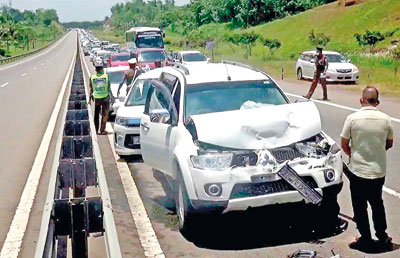News
New year but old tragedy brings over 50 road deaths
April 14, a day of celebration for the country, was marred by 121 road accidents in a day, and a prominent road expert emphasises that many road tragedies happen time after time in the same places.
In four days – from Tuesday to Friday night this week – more than 50 people died on the roads, police reported. On April 14, 11 people including an 18-month-old baby were killed and 70 others injured in 24 hours.
Professor Amal Kumarage of the Logistics Division of the University of Moratuwa, said governments took the simplest way out of the problem without determining the root cause of an accident.
“The ball is passed to the weakest person, the driver, who is arrested and charged by the police and the numbers added to the statistics chart,” Prof. Kumarage said.

Avurudu day accident on the Southern highway. Pic by Bimal Sharman Jayasinghe
Research showed that 60 per cent of accidents recur in the same spot and somewhat in the same manner. Black spots include poorly-designed bends, poor lighting, hazards and lack of pedestrian crossings.
Regular road safety audits have to be conducted to identify these black spots, Prof. Kumarage said. The recent Passara incident, where 14 people were killed and several injured could have been avoided if regular checks had been carried out and the boulder that had fallen on the road promptly cleared.
Dr. Kumarage called for safe road design, saying governments should accept the high costs involved.
The Road Development Authority’s (RDA) allocation of 1 per cent of third party insurance for road safety activities is inadequate, the World Health Organisation said in its “Sri Lanka Road Safety Report 2019”.
The Auditor-General’s Report for 2019 also points out that failure to rectify engineering defects on roads is partly to blame for a third of accidents ending in deaths and a further fifth in serious injuries.
Telephone and power lines obstructing roads also contribute to many accidents. Other factors include faded pedestrian crossing signs, bus halts located at junctions, lack of streetlights and unprotected railway crossings.
To cap it all, the Road Development Authority did not conduct road safety audits in 2016 and 2017 due to a lack of engineers.
Sweden’s Vision Zero programme, with the slogan, “Losing lives to traffic accidents is unacceptable in a civilised society” is being taken as a role model by countries faced with spiralling road accidents.
There, the government takes responsibility for every road fatality.
Prof. Kumarage contends that it is time people discarded what he calls their paradigm thinking that death is unavoidable.
“Come, raise your voices and say ‘enough is enough’ and demand concrete action from authorities,” he said.
“The people’s voice has to resound so that lawmakers start listening. Cry out for safer roads, make politicians include road safety in their manifesto during elections and push them to carry out their promises.”
In Sri Lanka, Prof. Kumarage said, the vehicle gets more priority over the injured person/s in accidents, and victims say they receive inadequate compensation.
The NCRS offers compensation only in case of hit-and-run accidents, giving Rs. 100,000 for fatalities and Rs. 75,000 for seriously injured persons.
In 2019, the NCRS paid out Rs. 4.4 million to 22 claims of death, rejecting 30 claimants. Another Rs.3.3 million was paid for critical injuries.
Money collected from road traffic violation fines are shared among the Police Welfare Fund (40 per cent), the Postal Department (10 per cent) and the Consolidated Fund of the government (50 per cent).
The Attorney-General’s Report points out that 72 per cent of police officials at the Motor Traffic Division (MTD) have not followed traffic management courses.
It also notes that key stakeholders such as the NRCS, health ministry and Sri Lanka Insurance Institute are not participants in the accidents database kept by the MTD.
An average of 38,000 accidents and 3,000 deaths have been reported annually in the last five years between 2016 to 2019. On an ordinary day an average of nine people are killed on the roads, with others often maimed for life.


